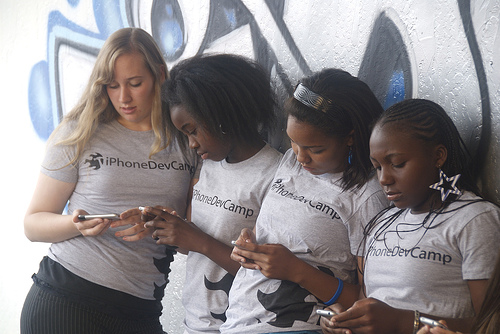
I was walking down the street some time ago and I heard a man explain to his son:
“You see, Danny, in the old days people didn’t have mobile phones…”
I didn’t pause to hear the rest. I was too struck that my past had already become someone else’s history. Danny had the same look on his face as I did when my parents had told me about the first days of television.
I walked on down the street and on either side there were phone shops entreating me to buy the latest cell phone with more minutes per month than I could possible use. Everywhere people were sitting in parks, cafes, walking down the street, all with phones pressed against their ears. Some of them had the invisible headsets that make it impossible to distinguish them from the insane who argued with themselves in public.
I remember that in the old days a hippy walking down the street with his mobile was practically advertising that he was a drug dealer. At the time, people thought beepers were the cool thing, the communication buzzers that added bulge to your jeans pocket. However they soon switched from risking testicular cancer to the more fashionable perils of brain tumours and there was no looking back.
In my book, Bozo and the Storyteller (free to read), I depicted phones as having tiny teeth that eat away at the moments of your life – the good conversations, the incredible sunset, the first kiss – and who hasn’t had a movie or performance interrupted by someone’s ringing phone? But you’ll never beat this story:
A Phone At a Funeral
An Englishwoman told me that she had been in church at the funeral of her husband’s aunt when she heard a phone ringing somewhere. Naturally, she assumed an indignant pout and started shooting silent glares around the pews. Who could be so gauche as not to turn off their phone before entering a funeral? The ringing stopped and then started again – clearly this was not a caller to be put off by an answering service.
By now even the vicar had halted his speech and hushed whispers were growing in volume within the acoustics of the old stone church. Suddenly she was seized by a growing panic as she realized that her handbag was vibrating. She opened the flap and perceived in the same moment as the entire congregation that she was the culprit. She snatched the phone with shaking hands but as she had only bought it the week before she had no idea how to turn it off. With 500 pairs of eyes fixed menacingly upon her she fumbled with the buttons in vain. With each second her husband grew violently tense at her side.
Finally he did the decent thing and grabbed the phone from her now paralyzed hands, dropped it on the floor and stamped on it. That didn’t quite do the trick though and he was obliged to stand up and jump on the thing before silence was restored to the ceremony. Apparently no one saw the funny side and the vicar even rubbed it in with some stern words about propriety in the House of the Lord.
The Modern World
Mobile phones are probably one of the best examples of how technology can change the nature of social interaction, even how we see the world. Try watching movies made before 1998 and you’ll see a hundred different plot twists that would never have arisen had one of the protagonists been carrying a phone. A killer white shark is stalking you on your broken down boat? Call the coast guard and he’ll have you air-lifted out of there in minutes.
Another example: Call round to see a friend by chance and watch the expression of shock on their face as they open the door – ‘but, but you didn’t call first to check I was in!’ Was it really so hard to meet up with friends in the old days? What was so bad about arranging to be somewhere and then… being there.
Bill Watterson perhaps said it best in his Calvin and Hobbes strip where Calvin says something along the lines of ‘Call this the 21st century? Where are the ray guns? The invisibility devices? Teleportation? I mean I still have to press the buttons on the remote control!’ Hobbes then observes that perhaps we could do with learning how to handle the technology that we already have.
Jamming With You
Perhaps the worst aspect of cell phones though is that they serve as amplifiers for all the mundane thoughts of strangers and uncomfortable insights into their lives. From the bored girl on the train who I recently heard explain in detail to her flatmate that while she lived the Heinz tangy flavour of beans, she wasn’t sure if she could eat it all the time, you know? So perhaps best to stick with the good old traditional cheese flavour…
It comes as no surprise then that cell phone jammers sell like hot cakes to commuters who are driven insane by listing to this mindless drivel every day. While highly illegal (yes, the airwaves are all the private property of the carriers), there’s a certain satisfaction in pressing a button and forcing someone to cut short their lover’s spat by phone when they’re sitting just behind you.
The Bright Side
But it’s not all bad. I was sitting with a few friends the other day, talking about how to get phone numbers from girls and the whole drama of then calling them up. He remarked philosophically:
“The advent of cell phones means you never have to speak to a girl’s parents ever again. You always get through directly to her.”
Then again with caller ID, getting her to answer the damn thing is another story.







